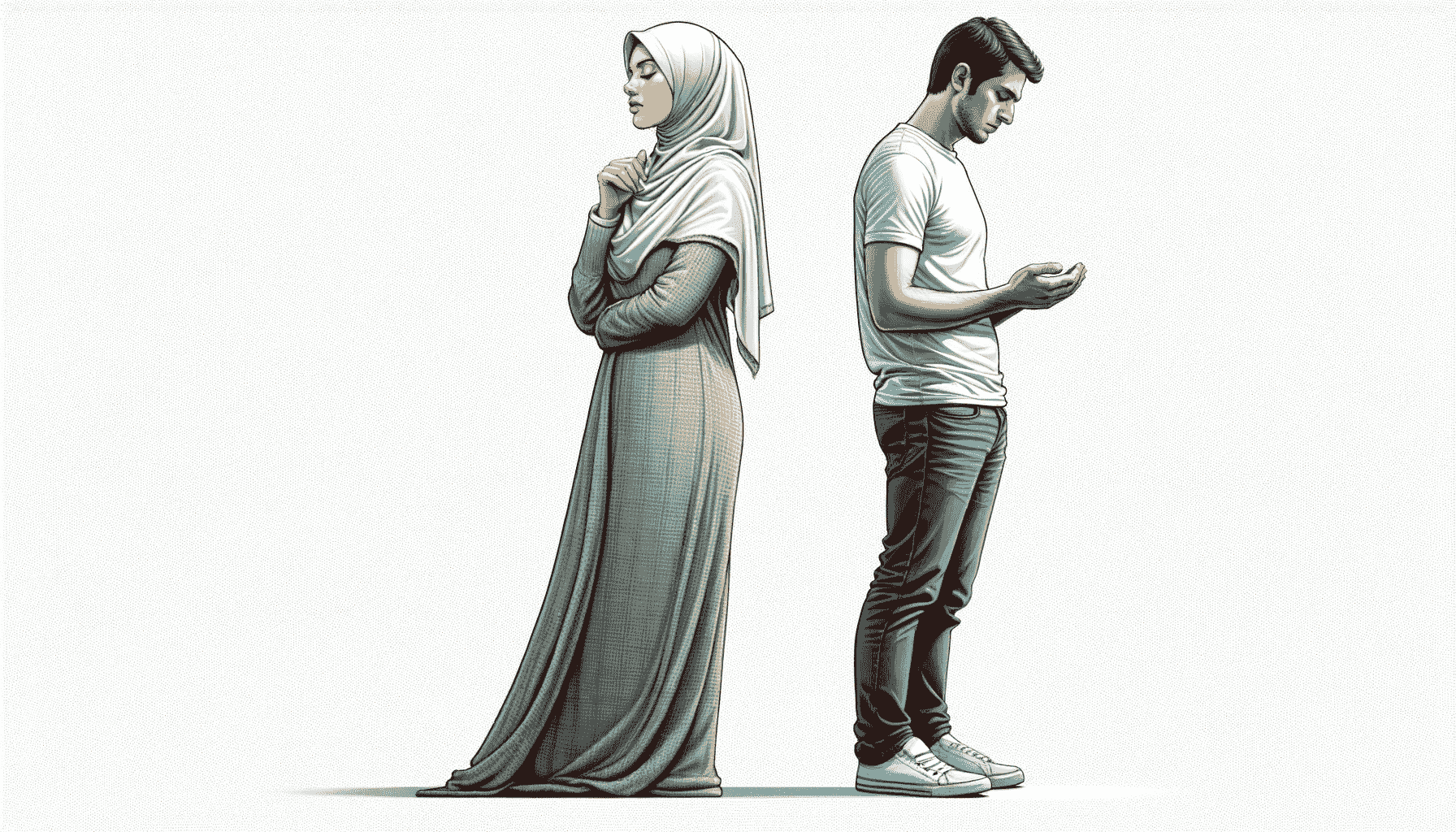Sharing is caring!
When you decide to marry someone who doesn’t share your belief system, it can lead to a unique set of challenges and experiences.
This decision isn’t just about who you love; it also involves how you navigate life’s big questions and daily routines with someone who views the world differently.
At the heart of an interfaith marriage are the differences in belief systems. And these differences can affect everything from your daily interactions to major life decisions.
How do you celebrate holidays, or what values do you teach your children?
These questions become crucial in a marriage where partners hold different religious or spiritual beliefs.
This article explores the various consequences of marrying an unbeliever, shedding light on both the challenges and the unexpected rewards that can come from such a union.
1. Marrying an Unbeliever Can Impact Shared Values

Marrying someone with a different belief system often leads to complex situations, especially when it comes to values.
Imagine a scenario where one person values Sunday church, while the other prefers a lazy brunch or a morning run.
These differences can seem small at first, but over time, they might grow into significant disagreements about what is important in life.
It’s not just about religious rituals; it extends to moral and ethical views too.
If one partner believes in honesty at all costs and the other thinks little white lies are okay in certain situations, you can see how conflicts might arise.
On a deeper level, there’s the question of raising children. What beliefs will they be taught? How will they be educated about religion?
It’s crucial to consider how these differences in values and beliefs will be navigated in the long term. It’s not just about finding a middle ground; it’s also about respecting each other’s beliefs while maintaining your own.
Furthermore, it’s important to consider the support system. Often, our beliefs connect us to a wider community.
When two people share different belief systems, it can affect their social circles and support networks. This can lead to feelings of isolation or disconnection for one or both partners, especially during challenging times.
2. Communication Challenges in an Interfaith Marriage
When two people don’t share the same belief system, communication can become a tricky affair.
You might find that what’s a casual remark for one can be deeply offensive to the other.
For instance, joking about religious figures or practices might be normal in some cultures but extremely disrespectful in others.
This can lead to misunderstandings and hurt feelings, even when no harm is intended.
There’s also the aspect of deep, philosophical discussions. Topics like the meaning of life, afterlife beliefs, and moral dilemmas are approached differently by various belief systems.
In an interfaith marriage, these discussions can be enriching, but they can also be a source of conflict. It requires a lot of empathy and the ability to agree to disagree at times.
Effective communication in such a marriage isn’t just about talking; it’s also about listening.
It involves understanding where the other person is coming from, acknowledging their beliefs, and respecting their viewpoints, even when they differ from yours.
3. Impact on Relationships with Family and Friends
Family gatherings, holidays, and celebrations often have religious or cultural undertones. In an interfaith marriage, these occasions can become sources of tension.
Maybe one family expects a traditional religious wedding while the other doesn’t. Or there might be disagreements about how to celebrate holidays or which religious rituals to follow for children.
Extended family members might have strong opinions about interfaith marriages.
Some might be openly accepting, while others may have reservations or even outright objections. Navigating these differing opinions and reactions requires tact and can be emotionally draining.
And let’s not forget friendships can also be affected. Friends who share your beliefs might have difficulty understanding your choice of partner.
On the other hand, making new friends who are more accepting of interfaith relationships can be a source of support. It’s all about finding a balance and building a community that respects and supports your marriage.
4. Financial and Lifestyle Choices
When you’re in a marriage where beliefs diverge, even everyday decisions can get complicated.
Let’s talk about money, for example. One partner might believe in tithing a portion of their income to the church, while the other might see that as unnecessary or prefer to spend or save that money differently.
Financial priorities can become a battleground, with each partner pulling in a different direction based on their beliefs.
Lifestyle choices are another area where differences can surface.
Consider dietary habits – maybe one person’s faith requires specific dietary laws, while the other has no such restrictions. Or think about leisure activities; what’s acceptable and fun for one might be frowned upon by the other’s belief system.
Finding a balance that respects both partners’ views can be challenging but essential for harmony in the relationship.
5. Parenting and Family Dynamics
Parenting can be a complex journey, more so in a marriage with differing belief systems. The question of how to raise the kids can be a major source of contention.
Should they attend church, temple, or no religious services at all? What values should they be taught, and whose beliefs will take precedence?
These are not just theoretical questions; they have real, day-to-day implications in raising children.
Then there’s the influence of extended family. Grandparents, aunts, uncles, and cousins might all have their own opinions and expectations regarding the children’s upbringing.
Navigating these varied perspectives while trying to maintain a united front as parents can be quite a challenge.
6. Social Expectations and Community Pressure
In many societies, there’s still a strong expectation for people to marry within their own faith.
When you marry an unbeliever, it can sometimes feel like you’re going against the grain. This can lead to a sense of isolation or judgment from the community, which can be tough to handle.
There’s also the aspect of religious and social events. Deciding which events to participate in as a couple, and how to engage with each community, can be a delicate balancing act.
There’s often pressure to conform to certain norms and practices, which can be stressful if they don’t align with your personal beliefs or those of your spouse.
7. Personal Growth and Self-Discovery

It’s not all challenges, though. Marrying someone with different beliefs can be a profound journey of personal growth and self-discovery.
It pushes you to think deeply about your own beliefs, why you hold them, and how they shape your view of the world. This kind of introspection can be incredibly enriching.
Being exposed to different perspectives can also broaden your worldview. It can foster a sense of empathy and understanding, not just for your spouse’s beliefs, but for people from all walks of life. This can lead to a richer, more nuanced understanding of the world.
8. Rituals and Celebrations
In a marriage with differing faiths, even the simple act of celebrating can become a complex issue.
Take religious holidays, for instance. They’re not just dates on a calendar; they carry deep meaning and traditions.
How do you honor Ramadan while your partner is used to a big Easter celebration? These are not just logistical questions about what to cook for dinner.
They’re about respecting each other’s heritage and finding ways to celebrate together without diminishing the significance of these occasions.
And then there’s the matter of rituals – from weekly worship to rites of passage like baptisms or bar mitzvahs.
Participating in, or even just respectfully observing, your partner’s rituals can be a beautiful gesture of love and respect.
9. Feeling Disconnected
Sometimes, being married to someone who doesn’t share your beliefs can leave you feeling a bit adrift.
There’s this sense of disconnection, not just from your partner in certain aspects but also from your own community.
Imagine religious holidays or significant spiritual moments that are deeply meaningful to you.
When your partner doesn’t share that sentiment or understanding, it can feel lonely. This isn’t about blaming them; it’s just a reality of having different belief systems. It’s crucial to find ways to bridge this gap or find support elsewhere.
10 Different Approaches to Conflict
Every couple faces disagreements, but when you have different belief systems, the way you handle conflicts can vary greatly.
Your faith or beliefs might guide you towards certain approaches to conflict resolution, such as prayer or seeking counsel from religious leaders.
Your partner, however, might lean towards more secular methods like mediation or therapy. It’s not that one way is better than the other, but this divergence can sometimes make resolving disagreements more complex.
[Also Read: 10 Signs Your Husband Puts His Family First]
6 Vital Tips For Marrying An Unbeliever

1. Communication is Even More Important
Talking things out can really make a difference. When marrying someone with different beliefs, it’s key to have open and honest conversations about your differences.
This isn’t just about big topics like morality or the afterlife; it also covers day-to-day life.
How will you spend your holidays? What are your thoughts on dietary choices or Sunday rituals?
Getting these conversations out in the open early can prevent misunderstandings later on.
Remember, it’s not just about stating your viewpoint; it’s equally about listening. The goal isn’t to win an argument but to understand each other better.
When both partners feel heard and respected, navigating through differences becomes much easier.
2. Respect Each Other’s Beliefs
Respect is the cornerstone of any strong relationship. When your partner has different beliefs, showing respect for those beliefs is crucial.
This doesn’t mean you have to agree with everything they believe in. Rather, it’s about acknowledging their right to hold those beliefs.
Mocking or belittling each other’s views can only lead to resentment and hurt.
Another part of respecting beliefs is participating in or observing certain rituals that are important to your partner, even if you don’t share the same faith.
You don’t have to convert or change your beliefs, but showing interest and support in your partner’s practices can strengthen your bond.
3. Establish Common Values
While your beliefs might be different, finding common ground on core values can be a great foundation for your marriage.
Values like honesty, kindness, and a strong work ethic can be shared, regardless of religious beliefs.
Focusing on these shared values helps you work as a team and provides a common framework for making decisions, especially in parenting.
Identify these values together and discuss how you can actively incorporate them into your relationship.
This approach helps in creating a cohesive home environment where both partners feel their core principles are respected and valued.
4. Plan for the Future with Flexibility
When you’re building a life with someone who doesn’t share your beliefs, it’s important to plan for the future, but with a flexible mindset.
This is especially true when thinking about children.
How will you raise them in terms of beliefs and practices? Discuss these things openly, and be prepared to compromise and adapt as situations change.
Flexibility also means being open to each other’s evolving beliefs and circumstances. People change, and so do their views.
Being adaptable allows your relationship to grow and evolve over time, strengthening your bond.
5. Build a Supportive Community
Having a supportive circle of friends and family is invaluable, especially in an interfaith marriage.
It’s great if you can find others who are in a similar situation, as they can offer insights and support from their own experiences.
But even friends and family who aren’t in interfaith marriages can provide support, as long as they respect your choices and offer a non-judgmental space.
Building this community might mean reaching out to new groups, attending different events, or even seeking online forums.
The key is to surround yourselves with people who uplift your relationship and understand the unique dynamics of marrying someone with different beliefs.
6. Practice Patience and Understanding
Patience is a virtue, and it’s particularly vital in a marriage where you don’t share the same belief system.
There will be times when your differences seem challenging, and it’s in these moments that patience and understanding are most needed.
Remember, every relationship has its ups and downs; it’s the willingness to work through them that counts.
Understanding comes from putting yourself in your partner’s shoes. How do they feel during religious holidays or family events?
Being empathetic can help you navigate these situations with compassion and love. It’s about creating a partnership where both of you feel supported and understood, no matter what life throws your way.
Are There Advantages In Marrying An Unbeliever?
Yes, there can be advantages to marrying someone with different beliefs. One of the biggest benefits is the opportunity to see the world from a new perspective.
When you’re with someone who thinks differently, you get exposed to new ideas and ways of thinking. This can be really enriching and help you grow as a person.
It’s like getting a fresh pair of eyes on the world. Plus, it can make your life more interesting, with a mix of traditions and experiences you might not have encountered otherwise.
Another advantage is that it can strengthen your communication skills. When you have to navigate through different beliefs and opinions, you learn to express yourself clearly and listen actively.
It’s a great way to build empathy and understanding. You learn to appreciate differences, not just tolerate them.
In a way, it can make your relationship stronger because you’re constantly working on understanding and respecting each other.
Should A Believer Marry An Unbeliever?
This is a personal choice and depends on many factors. For some believers, sharing the same faith is a crucial part of a relationship.
It can provide a common ground for many aspects of life, from moral values to how you spend your Sundays.
If your faith is a central part of your identity, you might find it important to share this with your partner. In this case, marrying someone with the same belief system might be essential for you.
However, love and compatibility aren’t always bound by shared beliefs. If you’re open to the idea of being with someone who thinks differently, it can work.
The key is mutual respect and a willingness to understand each other. It’s important to consider how you’ll navigate challenges like raising children or dealing with family expectations.
If you’re willing to communicate, compromise, and respect each other’s beliefs, it’s possible to have a successful and fulfilling relationship with an unbeliever.
[Interesting: When Your Daughter Chooses Boyfriend Over Family]
FAQs

What Happens When You Marry an Unbeliever?
When you marry someone with different beliefs, it can lead to unique challenges and learning experiences.
You might face differences in how you view the world, celebrate holidays, or make decisions about your kids. But it’s not all tough stuff.
This kind of marriage can also bring a lot of growth and understanding. You learn to communicate better, respect different viewpoints, and create a unique blend of your cultures and traditions. It’s all about finding balance and respect for each other’s beliefs.
What Does God Say About Marrying a Non-Believer?
In many religious texts, like the Bible, there are passages that suggest marrying a non-believer is discouraged.
For example, 2 Corinthians 6:14 talks about not being ‘unequally yoked’ with non-believers. The idea here is that sharing a similar faith can make a marriage stronger and more harmonious.
However, interpretations can vary among different religious groups and individuals.
Some people view this as a strict guideline, while others may interpret it more flexibly, focusing on the shared values and love between partners.
How Do You Make an Interfaith Marriage Work?
Making an interfaith marriage work involves a lot of communication, respect, and compromise.
You need to talk openly about your beliefs, traditions, and how you’ll handle differences.
Respect is key – you don’t have to agree on everything, but respecting each other’s beliefs and practices is crucial.
Compromising, especially on things like holidays, raising kids, and dealing with family, helps a lot. It’s also important to keep an open mind and be willing to learn about and from each other’s beliefs.
Sharing is caring!
